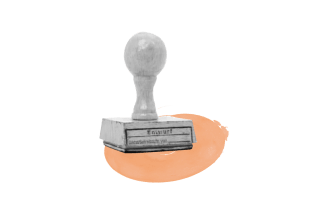Name Directory by Last Name: Last Names Starting with Ja
Explore millions of names to discover rich genealogical details and uncover your family's history
Enter a name to research
Last name meanings and origins
- James
The surname James has deep historical roots, primarily derived from the Hebrew name Yaakov (Jacob), meaning "supplanter." It gained prominence in medieval Europe, particularly in England and Scotland, where it was adopted as a given name before evolving into a surname. The name became widely recognized due to its association with several biblical figures, notably James the Just, a leader in the early Christian church, and James, son of Zebedee, one of the apostles.
- Jacobs
The surname Jacobs has its historical roots in the Hebrew name "Yaakov," which translates to "supplanter" or "holder of the heel." This name is biblically significant, as it is associated with the patriarch Jacob, a key figure in the Old Testament. The surname began to appear in various forms in medieval Europe, particularly among Jewish communities, where it was often adopted as a patronymic surname, indicating "son of Jacob." Over time, Jacobs became prevalent in England, the Netherlands, and other parts of Europe, often linked to occupations such as farming or trade, reflecting the agrarian and mercantile lifestyles of those who bore the name.
- Jansen
The surname Jansen has its historical roots in the Netherlands and is derived from the given name Jan, which is the Dutch form of John. The suffix "-sen" means "son of," indicating a patronymic origin.
- Jacobsen
The surname Jacobsen has its historical roots in Scandinavia, particularly in Denmark and Norway, where it originated as a patronymic surname meaning "son of Jacob." The name Jacob itself is derived from the Hebrew name Yaakov, which means "to follow" or "to supplant." The use of patronymics was common in these regions, where surnames were often formed by adding a suffix to the father's name, indicating lineage. Over time, Jacobsen became a common surname, particularly in Denmark, where it reflects the social structure of the time, emphasizing familial connections and heritage.
- Jacobson
The surname Jacobson has its historical roots in the Hebrew name "Yaakov," which translates to "Jacob" in English. This surname is patronymic in nature, meaning it derives from the given name of an ancestor, specifically indicating "son of Jacob." The use of surnames in this manner became more common in Europe during the Middle Ages, particularly in Jewish communities, where it was often adopted to signify lineage.
- Jarvis
The surname Jarvis has its historical roots in medieval England, deriving from the given name "Gervase," which itself comes from the Old French "Gervais." The name was introduced to England by the Normans after the Conquest of 1066. Over time, Jarvis evolved as a patronymic surname, indicating "son of Gervase." The name is often associated with various occupations, particularly in the context of the feudal system, where individuals bearing the name may have held roles as stewards or caretakers of land.
- Jack
The surname Jack has a rich historical background, with roots tracing back to the medieval period in England. It is derived from the given name "Jack," which itself is a diminutive of "John," a name of Hebrew origin meaning "God is gracious." The use of Jack as a surname began to emerge in the 14th century, often associated with individuals who were known by this nickname.
- Jacob
The surname Jacob has deep historical roots, tracing back to the Hebrew name Yaakov, which means "to follow" or "to supplant." It is most famously associated with the biblical figure Jacob, the son of Isaac and Rebecca, who is a patriarch in the Jewish, Christian, and Islamic traditions. The name began to appear in various forms across Europe during the Middle Ages, particularly in regions influenced by Jewish and Christian cultures.
- Jansson
The surname Jansson has its historical roots in Scandinavia, particularly in Sweden and Finland, where it is derived from the given name Jan, a variant of Johannes, meaning "God is gracious." The suffix "-sson" indicates "son of," thus Jansson translates to "son of Jan." This patronymic naming convention was common in Nordic cultures, where surnames often reflected lineage and familial connections. The surname likely emerged in the late Middle Ages, around the 14th to 16th centuries, as fixed surnames became more prevalent.
- Jans
The surname Jans has its roots in the given name "Jan," which is a diminutive of "Johannes," meaning "God is gracious" in Hebrew. This surname is predominantly found in the Netherlands and Belgium, where it first appeared in the medieval period, particularly during the 13th century.
- Janssen
The surname Janssen has its roots in the Netherlands and is derived from the given name Jan, which is the Dutch form of John. The suffix "-sen" means "son of," indicating a patronymic origin.
- Jacques
The surname Jacques has its roots in the given name "Jacques," which is the French form of the name James, derived from the Hebrew name Yaakov (Jacob). Historically, the surname began to appear in France during the medieval period, particularly in the 12th century, as a patronymic surname indicating "son of Jacques." The name itself has connotations of "supplanter," reflecting the biblical Jacob's story.
- Jarrett
The surname Jarrett has its historical roots in medieval England, deriving from the given name "Gerard," which itself comes from the Old Germanic elements "ger," meaning spear, and "hard," meaning brave or hardy. The name was popularized in England after the Norman Conquest of 1066, as many Normans brought their names and customs to Britain.
- Jacobsson
The surname Jacobsson has its historical roots in Scandinavia, particularly in Sweden, where it is derived from the given name Jacob, meaning "supplanter" in Hebrew. The suffix "-sson" translates to "son of," indicating a patronymic tradition common in Nordic cultures.
- Jane
The surname Jane has historical roots that can be traced back to the medieval period in England, deriving from the given name "Jane," which itself is a feminine form of "John." The name John comes from the Hebrew name Yochanan, meaning "God is gracious." The use of surnames became more common in England during the 13th century, often reflecting personal names, occupations, or geographical features. As a surname, Jane may have originally indicated "the daughter of John" or could have been adopted by families to signify a connection to a notable ancestor named John.
- Jameson
The surname Jameson has its historical roots in Scotland and England, deriving from the given name "James," which itself comes from the Hebrew name "Yaakov" (Jacob). The suffix "-son" indicates "son of," thus Jameson essentially means "son of James." The name began to appear in written records in the late medieval period, with its earliest instances found in Scotland during the 14th century.
- Jay
The surname Jay has its historical roots in England, where it is believed to have originated as a nickname derived from the Old French word "jai," meaning "jaybird." This connection to the bird may have symbolized qualities such as liveliness or a cheerful disposition, traits often associated with the jaybird itself. The surname began to appear in written records during the medieval period, with its earliest instances found in the 13th century.
- Jamison
The surname Jamison has its historical roots primarily in England and Scotland, deriving from the given name "James," which itself comes from the Hebrew name "Yaakov" (Jacob). The name James became popular in medieval times, particularly after the Norman Conquest of 1066, when it was introduced to England.
- Jamieson
The surname Jamieson has its historical roots in Scotland, deriving from the given name "James," which itself comes from the Hebrew name "Yaakov" (Jacob). The name became popular in medieval Scotland, particularly after the reign of King James I in the 15th century.
- Jansdotter
The surname Jansdotter, of Scandinavian origin, is a patronymic name meaning "daughter of Jan," with "Jan" being a variant of the name Johannes, which translates to "John" in English. This naming convention was prevalent in Sweden and other Nordic countries, where surnames were often derived from the father's first name, indicating lineage.
- Jacoby
The surname Jacoby has its historical roots in the Hebrew name "Yaakov," which translates to "supplanter" or "holder of the heel." The name first appeared in medieval Europe, particularly among Jewish communities, where it was often adopted as a surname in the 18th and 19th centuries. As Jewish families migrated across Europe, particularly to Germany and Poland, the surname Jacoby became more prevalent.
- Jaeger
The surname Jaeger has its roots in the German language, deriving from the Middle High German word "jæger," which translates to "hunter." Historically, the surname first appeared in the medieval period, particularly in regions of Germany, where hunting was a significant activity both for sustenance and as a noble pursuit. The name was often associated with individuals who held the occupation of a hunter or those who were part of the nobility, as hunting was a favored pastime among the aristocracy.
- Jacquet
The surname Jacquet has its historical roots in France, deriving from the given name "Jacques," which is the French form of "James." The name itself is derived from the Hebrew name "Yaakov," meaning "supplanter." The surname Jacquet first appeared in the medieval period, particularly in the northern regions of France, where it was common for surnames to evolve from personal names. Over time, individuals bearing the surname often engaged in various occupations, including farming and trade, reflecting the agrarian and mercantile society of the time.
- Jakobsen
The surname Jakobsen has its roots in Scandinavia, particularly in Denmark and Norway, where it originated as a patronymic surname meaning "son of Jakob." The name Jakob itself is derived from the Hebrew name Yaakov, which means "supplanter" or "holder of the heel." The use of patronymics was common in these regions, especially during the Middle Ages, as it helped to identify individuals based on their father's name. Over time, the surname Jakobsen became associated with various occupations, often linked to agrarian lifestyles, as many bearers of the name were involved in farming or trades related to rural life.
- Jackman
The surname Jackman has its historical roots in England, with origins tracing back to the medieval period. It is derived from the given name "Jack," which itself is a diminutive of "John," combined with the suffix "-man," indicating "son of" or "servant of." The name Jackman likely emerged in the 13th century, as surnames began to be adopted for identification purposes.
- Janes
The surname Janes has its historical roots primarily in England, where it is derived from the given name "Jane," which itself is a feminine form of the name "John." The name John comes from the Hebrew name Yochanan, meaning "God is gracious." The surname Janes likely emerged in the medieval period, around the 13th century, as a patronymic surname, indicating "son of Jane" or "descendant of Jane." Over time, it became associated with various occupations, particularly in rural communities where individuals were often identified by their familial connections. The surname may also reflect social roles, as many bearers of the name were involved in agriculture or trades common in their regions. Culturally, the surname Janes has seen variations in spelling and pronunciation across different regions, particularly in the United Kingdom and the United States.
- Jansz
The surname Jansz has its historical roots in the Netherlands, particularly among Dutch-speaking communities. It is a patronymic surname, meaning it is derived from the given name of an ancestor, in this case, "Jan," which is the Dutch form of "John." The suffix "-sz" indicates "son of," thus translating to "son of Jan." This naming convention was common in the Netherlands during the 16th and 17th centuries, a period marked by significant social and economic changes, including the rise of trade and the establishment of the Dutch Republic.
- Jasper
The surname Jasper has historical roots that can be traced back to the Middle Ages, primarily in England and France. It is derived from the given name "Jasper," which itself is of Persian origin, meaning "treasurer." The name gained popularity in Europe due to its association with one of the Three Wise Men in Christian tradition, who is often referred to as Saint Jasper.
- Jacquot
The surname Jacquot has its historical roots in France, where it is believed to have originated as a diminutive form of the name Jacques, which itself is derived from the Hebrew name Yaakov (Jacob). The name Jacques was popular in medieval France, and the suffix "-ot" indicates a familiar or affectionate form, suggesting that the original bearers of the surname were likely connected to someone named Jacques.
- Jacobsdr
The surname Jacobsdr, a variant of Jacobs, has its historical roots in the Hebrew name Yaakov, meaning "supplanter" or "holder of the heel." This surname first appeared in medieval Europe, particularly in the Jewish communities of Spain and later in the Ashkenazi communities of Central and Eastern Europe. Over time, Jacobsdr evolved as a patronymic surname, indicating "son of Jacob," and became associated with various occupations, including those of merchants, scholars, and craftsmen, reflecting the diverse roles that individuals with this surname played in their communities.
- Jansdr
The surname Jansdr, a patronymic derived from the given name Jan, has its historical roots in the Netherlands and Scandinavia, where it first appeared in the medieval period. The name Jan is a variant of Johannes, meaning "God is gracious," and the suffix "-dr" indicates "son of," thus translating to "son of Jan." This surname likely emerged in the 16th century, during a time when surnames became more standardized in Europe.
- Jarman
The surname Jarman has its historical roots in England, with its earliest appearances dating back to the medieval period. It is believed to be derived from the Old French personal name "Germain," which itself comes from the Latin "Germanus," meaning "brother" or "related." The name likely entered England after the Norman Conquest of 1066, as many French names were adopted by the English nobility and commoners alike.
- Jacobi
The surname Jacobi has its roots in the Latin name "Jacobus," which is derived from the Hebrew name "Yaakov" (Jacob). Historically, the surname first appeared in medieval Europe, particularly in regions such as Germany and the Netherlands, where it was often used as a patronymic surname, indicating "son of Jacob." The name became associated with various occupations, particularly in the context of Jewish communities, where it was common for surnames to reflect lineage or ancestry.
- Jagger
The surname Jagger has its historical roots in England, with its earliest appearances dating back to the medieval period. It is believed to derive from the Old French word "jaguer," meaning "to cut" or "to notch," which likely referred to a person who was a maker of notched tools or a person who worked with wood.
- Jaques
The surname Jaques has its historical roots in the Old French name "Jacques," which is derived from the Latin "Iacobus," meaning "supplanter." The name first appeared in France during the medieval period, particularly in the 12th century, and was commonly associated with the Christian name James. As a patronymic surname, Jaques often indicated lineage, suggesting "son of Jacques." Over time, individuals bearing this surname were frequently linked to various occupations, including those of artisans, merchants, and landowners, reflecting the social roles prevalent in medieval society.
- Janson
The surname Janson has its historical roots primarily in Northern Europe, particularly in Scandinavia and the Netherlands. It is derived from the given name "Jan," which is a variant of "John," meaning "God is gracious" in Hebrew.
- Jardine
The surname Jardine has its historical roots in Scotland, particularly in the region of Dumfries and Galloway. The name is derived from the Old French word "jardin," meaning "garden," which suggests that the original bearers of the surname may have been associated with gardening or land cultivation.
- Jahn
The surname Jahn has its historical roots in Germany, deriving from the given name "Johann," which is the German form of "John." The name John itself has biblical origins, meaning "God is gracious." The surname Jahn likely emerged in the medieval period, around the 12th century, as a patronymic surname, indicating "son of Johann." Over time, it became associated with various occupations, particularly in agrarian societies where individuals were often identified by their father's name or their trade. The Jahn surname may also reflect geographical features, as many surnames in Germany are derived from local landmarks or regions, although specific associations for Jahn are less documented. Culturally, the surname Jahn has variations across different regions and languages, including "Jahnke" or "Jahnsson" in Scandinavian contexts, which reflect local linguistic adaptations.
- Jacquemin
The surname Jacquemin has its roots in the French-speaking regions of Europe, particularly in France and Belgium. It is derived from the given name "Jacques," which is the French form of "James." The name itself has biblical origins, tracing back to the Hebrew name "Yaakov," meaning "supplanter." The surname Jacquemin likely emerged during the medieval period, when surnames began to be adopted more widely, particularly in the 12th and 13th centuries.
- Jaffe
The surname Jaffe has its historical roots in the Jewish communities of Europe, particularly in the Ashkenazi tradition. It is believed to derive from the Hebrew name "Yafe," meaning "beautiful" or "handsome." The surname likely emerged in the Middle Ages, a period when Jews in Europe began adopting surnames for identification, often based on personal characteristics, occupations, or geographical locations.
Start your family tree for free
Start by entering a few names and MyHeritage will do the rest, so you can make meaningful discoveries
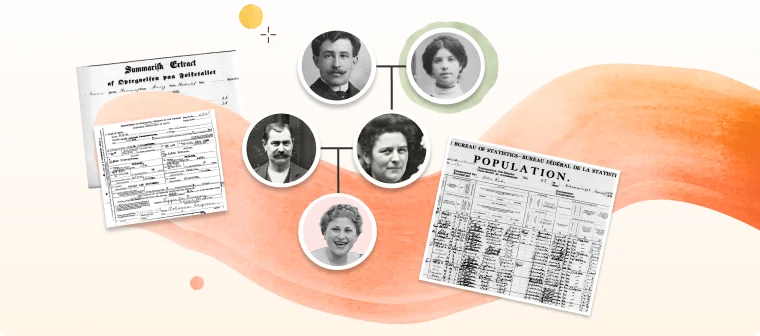
Explore historical records
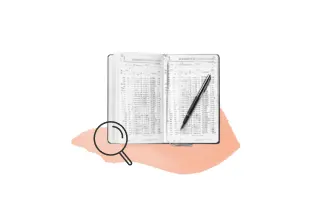
Explore 1,810,427,080 census and voter list records to get a detailed snapshot of your ancestors' lives. Discover names, ages, occupations, family relationships, residences, and much more.

Explore 4,647,704,406 birth, marriage, and death records. Uncover valuable details about major family milestones and find names, dates, places, occupations, and residences of your ancestors and relatives.

Search 266,544,192 military records and discover the stories of courage and resilience in your family history. Military records include enlistment dates, ranks, locations, and even physical descriptions.
Embark on a fascinating journey to discover your family history
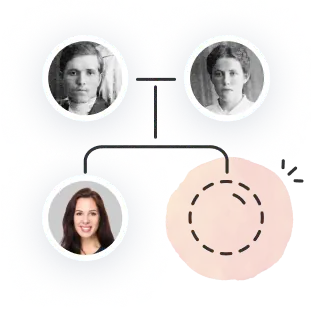
Start by adding a few names. Myheritage's automatic matching technology will help you expand your family tree and delight you with new discoveries.

Reveal your ethnic origins and find relatives you never knew existed with our simple DNA kit.
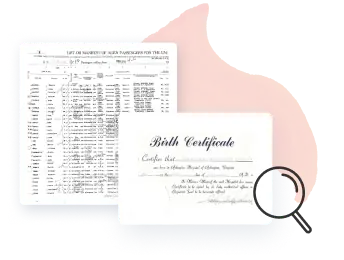
Dive into MyHeritage's international collection of 36.7 billion historical records - start with a name of an ancestor and see what our collections can reveal about your family history.
About MyHeritage

MyHeritage is the leading global platform for family history. It enriches the lives of people worldwide by enabling them to uncover more about themselves and where they belong. With a suite of intuitive products, billions of historical records, an affordable at-home DNA test, and AI-powered photo tools, MyHeritage creates a meaningful discovery experience that is deeply rewarding. The MyHeritage platform is enjoyed by tens of millions of people around the world who treasure and celebrate their heritage.




